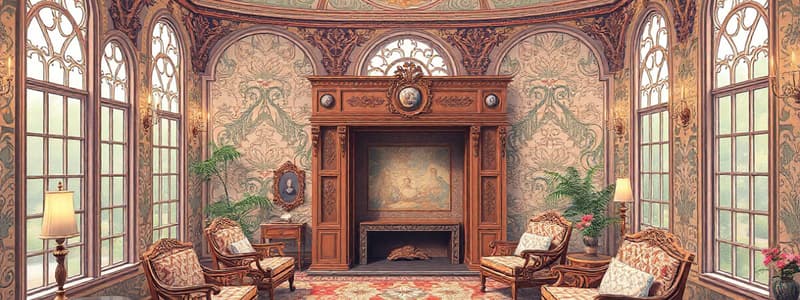Podcast
Questions and Answers
What does the word 'luxus' primarily refer to?
What does the word 'luxus' primarily refer to?
- Simple pleasures
- Excess and debauchery (correct)
- Luxury items
- Wealth accumulation
According to the Merriam-Webster dictionary, luxury can be defined as what?
According to the Merriam-Webster dictionary, luxury can be defined as what?
- A form of basic necessity
- An essential need for survival
- A condition of abundance or great ease and comfort (correct)
- A state of scarcity and minimalism
What aspect of luxury does Pierre Hermé emphasize?
What aspect of luxury does Pierre Hermé emphasize?
- Accessibility for all
- Mass production
- Cost and exclusivity
- Differentiation through creativity (correct)
What does luxury represent according to the interpersonal aspect mentioned?
What does luxury represent according to the interpersonal aspect mentioned?
Guy Savoy's view on luxury is that it lies in which of the following?
Guy Savoy's view on luxury is that it lies in which of the following?
What expectation is placed on students regarding their attitude?
What expectation is placed on students regarding their attitude?
What characteristic is highlighted as important for students to demonstrate?
What characteristic is highlighted as important for students to demonstrate?
Why are grades not disclosed before the official release date?
Why are grades not disclosed before the official release date?
What historical period is associated with the popularization of luxury?
What historical period is associated with the popularization of luxury?
Which two ancient civilizations are contrasted in their views on luxury?
Which two ancient civilizations are contrasted in their views on luxury?
What effect does increased purchasing power have on consumer behavior regarding luxury?
What effect does increased purchasing power have on consumer behavior regarding luxury?
What phenomenon occurs when lower classes imitate the lifestyle of the wealthy?
What phenomenon occurs when lower classes imitate the lifestyle of the wealthy?
Which of the following contributes to the democratization of luxury?
Which of the following contributes to the democratization of luxury?
What social change has enabled the emergence of new markets for luxury goods?
What social change has enabled the emergence of new markets for luxury goods?
What does the 'ratchet effect' in luxury consumption refer to?
What does the 'ratchet effect' in luxury consumption refer to?
How does globalization impact luxury consumption?
How does globalization impact luxury consumption?
What is one key factor that contributes to the luxury experience?
What is one key factor that contributes to the luxury experience?
How does the concept of luxury typically relate to social status?
How does the concept of luxury typically relate to social status?
Which characteristic is NOT typically associated with luxury items?
Which characteristic is NOT typically associated with luxury items?
What is one of the objectives of the luxury experience for consumers?
What is one of the objectives of the luxury experience for consumers?
What aspect does the sensory factor in luxury emphasize?
What aspect does the sensory factor in luxury emphasize?
Which of the following experiences reflects elitism in luxury consumption?
Which of the following experiences reflects elitism in luxury consumption?
Which of these elements is commonly linked to the concept of luxury?
Which of these elements is commonly linked to the concept of luxury?
What does the notion of 'scarcity and uniqueness' in luxury imply?
What does the notion of 'scarcity and uniqueness' in luxury imply?
What is emphasized as a crucial aspect of luxury brand identity?
What is emphasized as a crucial aspect of luxury brand identity?
Which characteristics differentiate luxury from premium brands?
Which characteristics differentiate luxury from premium brands?
According to the Brand Luxury Index (BLI), what function does a luxury brand fulfill?
According to the Brand Luxury Index (BLI), what function does a luxury brand fulfill?
What is a primary component of strategic marketing for luxury firms?
What is a primary component of strategic marketing for luxury firms?
What is NOT a characteristic associated with luxury brands?
What is NOT a characteristic associated with luxury brands?
What aspect does relationship marketing for luxury brands require?
What aspect does relationship marketing for luxury brands require?
Which of the following is NOT a distinguishing feature of luxury compared to trend brands?
Which of the following is NOT a distinguishing feature of luxury compared to trend brands?
In luxury marketing, what does 'utilitarian' refer to?
In luxury marketing, what does 'utilitarian' refer to?
Which of the following contrasts with the concept of luxury?
Which of the following contrasts with the concept of luxury?
Which term describes the consumer's perception of luxury brands in relation to their social status?
Which term describes the consumer's perception of luxury brands in relation to their social status?
What is a key characteristic of luxury brands compared to premium brands?
What is a key characteristic of luxury brands compared to premium brands?
Which function is primarily associated with the ostentatious nature of luxury brands?
Which function is primarily associated with the ostentatious nature of luxury brands?
What does the term 'phygital' refer to in luxury marketing?
What does the term 'phygital' refer to in luxury marketing?
Which aspect is vital for luxury brands to maintain their market position?
Which aspect is vital for luxury brands to maintain their market position?
What is one of the primary challenges luxury brands face due to digitalization?
What is one of the primary challenges luxury brands face due to digitalization?
How do luxury brands intend to address social and environmental issues?
How do luxury brands intend to address social and environmental issues?
What does the lifecycle of luxury products encompass?
What does the lifecycle of luxury products encompass?
Which of the following is NOT a characteristic associated with the identity function of luxury brands?
Which of the following is NOT a characteristic associated with the identity function of luxury brands?
What defines the utilitarian function of luxury brands?
What defines the utilitarian function of luxury brands?
What does the concept of 'scarcity' refer to in the context of luxury brands?
What does the concept of 'scarcity' refer to in the context of luxury brands?
Study Notes
Defining Luxury
- Luxury comes from the Latin word "luxus," meaning "excess, debauchery, and pomp."
- Merriam-Webster defines luxury as "a condition of abundance or great ease and comfort: sumptuous environment" and "an indulgence in something that provides pleasure, satisfaction, or ease."
- Luxury is associated with both an interpersonal aspect (related to social status and belonging) and a personal aspect (related to pleasure and comfort).
Various Conceptions of Luxury
- Pierre Hermé believes luxury is differentiation through creativity.
- Guy Savoy defines luxury as the richness of the craftmanship, the expression of creative genius, and ancestral know-how.
- Voltaire states, "What is superfluous is very necessary."
Origins of Luxury
- Luxury has been present since Greek Antiquity, with the contrast between Athens (embracing luxury) and Sparta (rejecting it).
- Egyptian Antiquity saw pomp during and after life, reserved for the elite.
- The 19th century saw the popularization of luxury due to liberalism and the industrial revolution.
- Monarchies and revolutions have played a role in defining luxury throughout history.
The Success of Luxury Today
- Emancipation of women has opened new markets for luxury goods.
- Increasing purchasing power, driven by economic growth, has fueled the demand for luxury products across social classes.
- Communication through mass media has promoted luxurious lifestyles, leading to imitation effects.
- Globalization has increased global wages and decreased prices, further boosting purchasing power.
- The ratchet effect prevents consumers from returning to non-luxury products after experiencing luxury, even if their income decreases.
Facets of Luxury
- Key facets of luxury include: excellent quality, scarcity and uniqueness, ancient heritage, high price, aesthetics and polysensuality, and superfluousness.
The Makings of Luxury
- Luxury goods involve emotion, aesthetic, pleasure, and hedonism, as well as quality and durability.
- Luxury products are priced higher than the product's functional use would suggest.
- Luxury is often linked to heritage, culture, history, and know-how.
- Luxury goods are rarely available and come with personalized services.
- Luxury serves as a marker of social status and provides a sense of entitlement.
Different ways to Experience Luxury
- Luxury = Experience
The Luxury Experience Factors
- Subjectivity: The meaning given to consumption and experiences depends on individual personality and context.
- Social factor: Social ties and bonds are crucial to the luxury experience.
- Sensory factor: Consumers perceive the world through the five senses.
Luxury Experience Objectives
- Materialism: Luxury experiences improve consumers' self-perception and sense of belonging.
- Social factor: The experience contributes to a sense of belonging to a social group.
- Distinctive experience: The experience expresses one's unique identity, values, and uniqueness.
- Elitism: The luxury experience reassures consumers of their ability to identify quality products and enjoy exclusive experiences.
Do Not Confuse
- Luxury is timeless, local, rare, and has a high price, while trends are passing, have cost control, and are widely available.
- Luxury emphasizes a unique experience and has a high price, while premium brands focus on quality warranting the price and comparisons with other brands.
- Luxury is a dream, social upliftment, out of time, and priceless, while trends are seduction, social imitation, instant, ephemeral, and value for money.
- Premium brands are serious, focus on performance, and are driven by realism, while trends are frivolous and driven by social status.
Reminder: Usual Marketing Approach
- The usual marketing approach involves analyzing and diagnosing, strategic marketing, and operational marketing.
Strategic Marketing for Luxury Firms
- Luxury marketing involves adapting the typical marketing approach to focus on positioning and targeting with specific attention to the luxury market.
Luxury Brand Functions (BLI)
- The Brand Luxury Index (BLI) defines the functions of luxury brands based on two dimensions: interpersonal and personal.
- The various BLI functions include: ostentatious, identity, distinctive, affective, and utilitarian.
BLI: Ostentatious Function
- Interpersonal: The brand is conspicuous, elitist, and extremely expensive, targeting the wealthy.
- Personal: This function is not relevant.
BLI: Identity Function
- Interpersonal: The brand represents leadership, power, and success.
- Personal: The brand is rewarding.
BLI: Distinctive Function
- Interpersonal: The brand emphasizes exclusivity, rarity, and uniqueness.
- Personal: The brand is precious.
BLI: Affective Function
- Interpersonal: The brand showcases exquisite, glamorous, and stunning aspects.
- Personal: This function is not relevant.
BLI: Utilitarian Function
- Interpersonal: The brand is characterized by being crafted, luxurious, and of the best quality.
- Personal: The brand is superior.
Production and Resources
- Luxury companies must preserve excellent know-hows and quality while promoting innovation throughout the value chain.
Lifecycle
- Factors like scarcity, novelty, sustainability, and usage define the lifecycle of luxury products.
Customer Relationship
- Luxury firms are facing the phygital challenge of balancing digitalization with exceptional offline experiences.
Responsibility
- Luxury businesses have a responsibility to be part of the social and environmental transition.
Globalization
- Luxury brands must be prepared to anticipate global risks and mitigate their dependence on specific geographic regions.
Studying That Suits You
Use AI to generate personalized quizzes and flashcards to suit your learning preferences.
Related Documents
Description
Explore the multifaceted definition of luxury, from its Latin roots to its various interpretations by notable figures. This quiz delves into how luxury reflects both personal pleasure and social status, highlighting its historical significance and cultural context.



